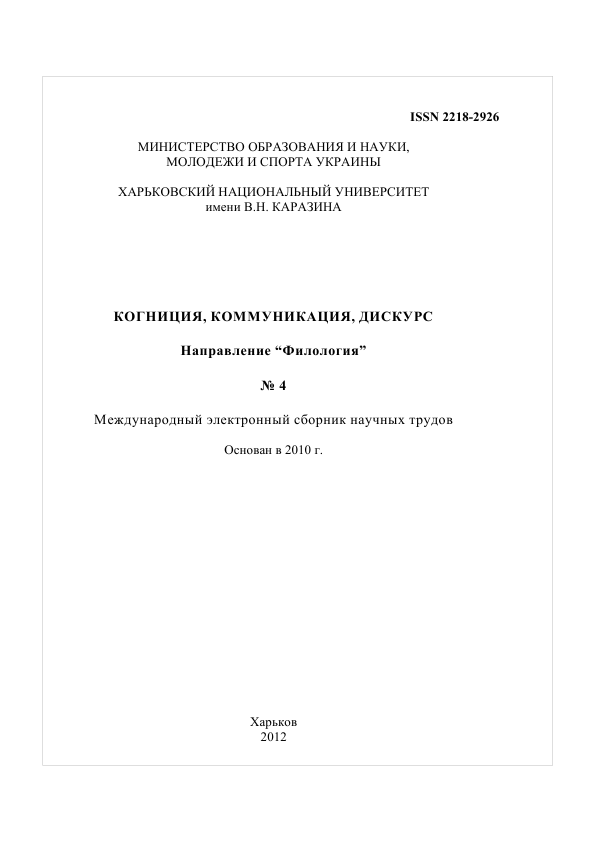Political myth and phantom enemy
Abstract
The article presents an analysis of lexico-grammatical, semantic and rhetoric language means of recontextualizing reality in political discourse. On the basis of the analysis of American presidents’ discourse it is concluded that the most efficient and widely spread methods of modeling an alternative reality in this discoursive space are nominalization, semantic ambiguity, over-lexicalization, and metaphorization.
Downloads
References
Bush, George W. Address to the Nation. September 20, 2001. URL: http://presidentialrhetoric.com/speeches/09.20.01.html. Accessed: 23.01.2011.
Bush, George W. Commencement Address at the United States Military Academy at West Point. June 1, 2002a. URL: http://presidentialrhetoric.com/speeches/06.01.02.html. Accessed: 23.01.2011.
Bush, George W. More on the Next 4 Years—Radio Address, November 6, 2004. URL: http://presidentialrhetoric.com/speeches/11.06.04.html. Accessed: 23.01.2011.
Bush, George W. Remarks to the U.N. New York. September 12, 2002b. URL: http://presidentialrhetoric.com/speeches/09.12.02.html. Accessed: 23.01.2011.
Bush, George W. The Iraqi Threat. October 7, 2002c. URL: http://presidentialrhetoric.com/speeches/10.7.02.html. Accessed: 23.01.2011.
Chang, G.C., Mehan, H.B. Why we must attack Iraq: Bush reasoning practices and argumentation system. In Discourse & Society. Vol. 19(4). Sage Publications, 2008. – Pp. 453–482.
Clinton, Bill. Statement on Kosovo. March 24, 1999. URL: http://millercenter.org/scripps/archive/speeches/detail/3932. Accessed: 23.01.2011.
Dunmire, P.L. Preempting the future: Rhetoric and ideology of the future in political discourse. In Discourse & Society. Vol. 16(4). Sage Publications, 2005. – Pp. 481-513.
Fairclough, N. Analysing Discourse: Textual Analysis for Social Research. London and New York: Routledge, 2003. – 270 p.
Lakoff, G. Don’t Think of an Elephant!: Know Your Values and Frame the Debate: The Essential Guide for Progressives. Chelsea Green Publishing, White River Junction, Vermont, 2004. – 144 p.
Lakoff, G., Johnson, M. Metaphors we live by. The University of Chicago press, 2003. – 276 p.
Lakoff, G. Women, Fire and Dangerous Things. University of Chicago Press, 1987. – 614 p.
Lazar, A, Lazar, M. M. The discourse of the New World Order: ‘out-casting’ the double face of threat. In Discourse & Society. Vol. 15(2-3). Sage Publications, 2004. – Pp. 223-242.
Mutz, D. C., Sniderman, P. M., Brody, R. A. (Eds.). Political Persuasion and Attitude Change. Univ. of Michigan press, 1996. – 295 p.
Reyes-Rodriguez, A. Hot and Cold War: The Linguistic Representation of a Rational Decision Filter. In Critical Approaches to Discourse Analysis across Disciplines. Vol 2(2). [Ejournal], 2008. – Pp. 31-47. URL: http://cadaad.org/ejournal. Accessed: 23.01.2011.
Van Dijk, T.A. Critical Discourse Analysis and Nominalization: Problem or Pseudo Problem. In Discourse & Society. Vol. 19(6). Sage Publications, 2008. – Pp. 821–828.
Van Leeuwen, T., Wodak, R. Legitimizing Immigration Control: A Discourse – Historical Analysis. In Discourse Studies. Vol. 1(1). Sage Publications, 1999. – Pp. 83-118.
Authors, who publish with this journal, accept the following conditions:
The authors reserve the copyright of their work and transfer to the journal the right of the first publication of this work under the terms of the Creative Commons Attribution License (CC BY), which allows other persons to freely distribute a published work with mandatory reference to the authors of the original work and the first publication of the work in this journal.
Authors have the right to enter into separate additional agreements for the non-exclusive dissemination of the work in the form in which it was published by this journal (for example, to post the work in the electronic institutions' repository or to publish as part of a monograph), provided that the link to the first publication of the work in this journal is given.
The journal policy allows and encourages the authors to place the manuscripts on the Internet (for example, in the institutions' repositories or on personal websites), both before the presentation of this manuscript to the editorial board and during review procedure, as it contributes to the creation of productive scientific discussion and positively affects the efficiency and dynamics of citing the published work (see The Effect of Open Access).




